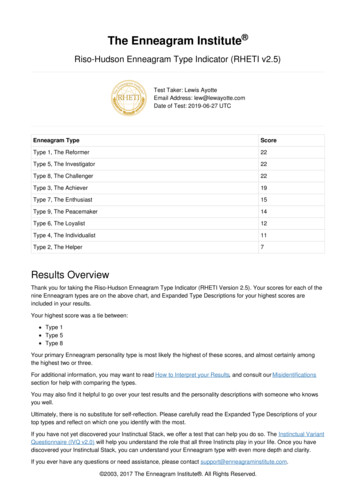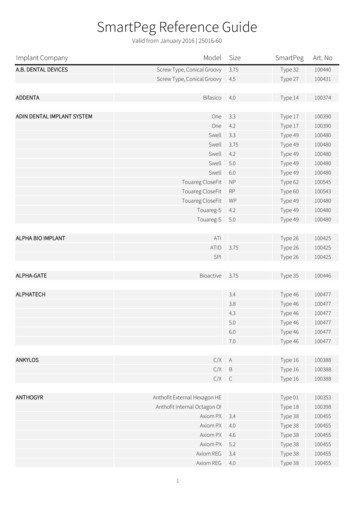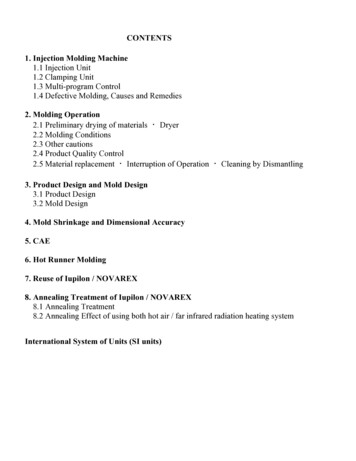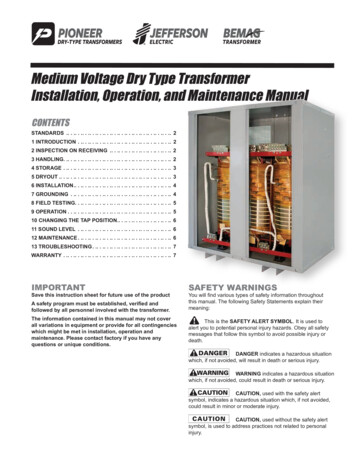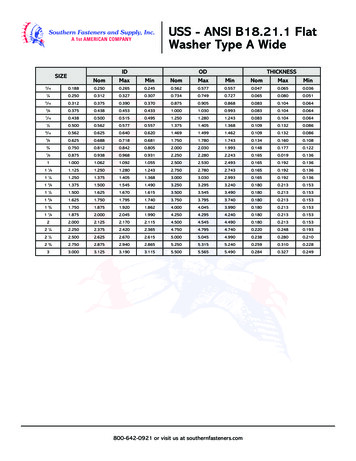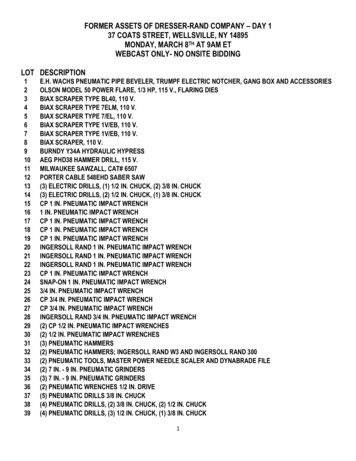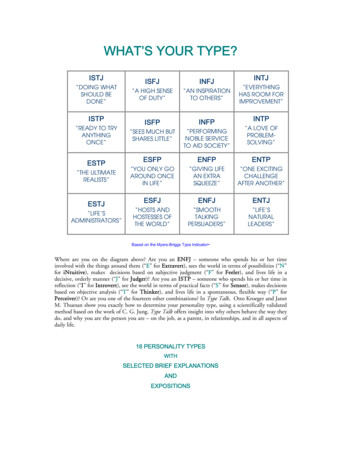
Transcription
WHAT’S YOUR TYPE?ISTJ“DOING WHATSHOULD BEDONE”ISTP“READY TO TRYANYTHINGONCE”ESTP“THE �INTJISFJINFJ“A HIGH SENSEOF DUTY”“AN INSPIRATIONTO OTHERS”ISFPINFP“SEES MUCH BUTSHARES LITTLE”“PERFORMINGNOBLE SERVICETO AID SOCIETY”ESFPENFPENTP“YOU ONLY GOAROUND ONCEIN LIFE”“GIVING LIFEAN EXTRASQUEEZE”“ONE EXCITINGCHALLENGEAFTER ANOTHER”“EVERYTHINGHAS ROOM FORIMPROVEMENT”INTP“A LOVE OFPROBLEMSOLVING”ESFJENFJENTJ“HOSTS ANDHOSTESSES OFTHE TURALLEADERS”Based on the Myers-Briggs Type IndicatorsmWhere are you on the diagram above? Are you an ENFJ – someone who spends his or her timeinvolved with the things around them (“E” for Extravert), sees the world in terms of possibilities (“N”for iNtuitive), makes decisions based on subjective judgment (“F” for Feeler), and lives life in adecisive, orderly manner (“J” for Judger)? Are you an ISTP – someone who spends his or her time inreflection (“I” for Introvert), see the world in terms of practical facts (“S” for Sensor), makes decisionsbased on objective analysis (“T” for Thinker), and lives life in a spontaneous, flexible way (“P” forPerceiver)? Or are you one of the fourteen other combinations? In Type Talk, Otto Kroeger and JanetM. Thuesan show you exactly how to determine your personality type, using a scientifically validatedmethod based on the work of C. G. Jung. Type Talk offers insight into why others behave the way theydo, and why you are the person you are – on the job, as a parent, in relationships, and in all aspects ofdaily life.16 PERSONALITY TYPESWITHSELECTED BRIEF EXPLANATIONSANDEXPOSITIONS
THE KEIRSEY TEMPERAMENT SORTER*For my patients and those who would benefit from gaining insight and a fullerunderstanding into and about your personality traits and those elusive influences that steermany of your life choices; that you may further enrich your life, increase more of whatworks for you and decrease what does not; deepen rapport and your connection with lovedones and friends; maintain good health and high spirits and reduce stress; and last, but notfinally, make your way in the world and enhance creative and business endeavors and yourservice to others.I have taken the liberty of offering up David Keirsey’s temperament sorter with informationand references from both Keirsey and Myers-Briggs all of whom have written books andoffer questionnaires for elucidating and organizing feedback about your personality andassisting in making life choices.You have my best wishes for an interesting and informative exercise which is not the endbut merely a new beginning. Follow-through and discover your rewards.Marie Margenau-Spatz, Ph.D.*The Keirsey Temperament Sorter is copyrighted by David Keirsey from the book Please Understand Me and Please Understand Me II Copyrighted 1978 David Keirsey.Page 2 of 9
Page 3 of 9THE KEIRSEY TEMPERAMENT SORTER*CHARACTERISTICS FREQUENTLY ASSOCIATED WITH EACH TYPEISTJISFJINFJINTJSerious, quiet, earn e. See to it thateverything is well organized.Take responsibility. Make uptheir own minds as to whatshould be accomplished andwork toward it steadily,regardless of protests ordistractions.Quiet, friendly, responsibleand conscientious. Workdevotedly to meet theirobligations and serve e. May need time tomaster technical subjects, astheir interests are usually nottechnical. Patient with detailandroutine.Loyal,considerate, concerned withhow other people feel.Succeed by perseverance,originality and desire to dowhatever is needed orwanted. Put their best effortsinto their work. espected for their firmprinciples. Likely to behonored and followed fortheir clear convictions as tohow best to serve thecommon good.Usually have original mindsand great drive for their ownideas and purposes. In fieldsthat appeal to them, theyhave a fine power toorganize a job and carry itthrough with or without en stubborn. Must learn toyield less important points inorder to win the sitive, kind, modest abouttheirabilities.Shundisagreements, do not forcetheir opinions or values onothers. Usually do not care tolead but are often loyalfollowers.Oftenrelaxedabout getting things done,because they enjoy thepresent moment and do notwant to spoil it by unduehaste or exertion.Full of enthusiasms andloyalties, but seldom talk ofthese until they know youwell. Care about learning,ideas,language,andindependent projects of theirown. Tend to undertake toomuch, then somehow get itdone. Friendly, but often tooabsorbed in what they aredoing to be sociable. Littleconcerned with possessionsor physical surroundings.ISTPCool onlookers – quiet,reserved, observing andanalyzing life with detachedcuriosity and unexpectedflashes of original humor.Usuallyinterestedinimpersonal principles, causeand effect, how and whymechanical things work.Exert themselves no morethan they think necessary,because any waste of energywould be inefficient.ESFPESTPMatter-of-fact, do not worryor hurry, enjoy whatevercomes along. Tend to likemechanicalthingsandsports, with friends on theside. May be a bit blunt orinsensitive. Can do math orscience when they see theneed.Dislikelongexplanations. Are best withreal things that can beworked, handled, taken apartor put together.Outgoing,easygoing,accepting, friendly, enjoyeverything and make thingsmore fun for others by theirenjoyment. Like sports andmaking things. Know what’sgoing on and join in ories.Arebestinsituations that need soundcommon sense and practicalability with people as well aswith things.ESFJESTJPractical, realistic, matter-offact, with a natural head forbusiness or mechanics. Notinterested in subjects theysee no use for, but can applythemselves when necessary.Like to organize and runactivities. May make goodadministrators, especially ifthey remember to considerothers’ feelings and points ofview.Warm-hearted,talkative,popular, conscientious, borncooperators,activecommittee members. Needharmony and may be good atcreating it. Always doingsomething nice for someone.Workbestwithencouragement and praise.Little interest in abstractthinking or technical subjects.Main interest is in things thatdirectly and visibly affectpeople’s lives.SENSING TYPESINTPQuiet, reserved, brilliant s. Logical to the pointofhair-splitting.Usuallyinterested mainly in ideas,with little liking for parties orsmall talk. Tend to havesharply defined interests.Need to choose careerswhere some strong interestcan be used and useful.ENFPENTPWarmly enthusiastic, highspirited,ingenious,imaginative. Able to doalmost anything that intereststhem. Quick with a solutionfor any difficulty and ready tohelp anyone with a problem.Often rely on their ability toimproviseinsteadofpreparing in advance. Canusuallyfind compellingreasons for whatever theywant.Quick, ingenious, good atmany things. Stimulatingcompany,alertandoutspoken. May argue forfun on either side of aquestion. Resourceful insolving new and challengingproblems, but may neglectroutine assignments. Apt toturn to one new interest afteranother. Skillful in findinglogical reasons for what theywant.ENTJENFJResponsive and responsible.Generally feel real concernfor what others think or want,and try to handle things withdue regard for other people’sfeelings. Can present aproposal or lead a groupdiscussion with ease andtact.Sociable,popular,active in school affairs, butput time enough on theirstudies to do good work.Hearty,frank,ableinstudies, leaders in activities.Usually good in anything thatrequiresreasoningandintelligent talk, such aspublic speaking. Are usuallywell-informed and enjoyadding to their fund ofknowledge. May sometimesbe more positive andconfidentthantheirexperience in an areawarrants.INTUITIVE TYPESCHARACTERISTICS FREQUENTLY ASSOCIATED WITH EACH TYPE*The Keirsey Temperament Sorter is copyrighted by David Keirsey from the book Please Understand Me and Please Understand Me II Copyrighted 1978 David Keirsey.EXTRAVERTSEXTRAVERTSINTUITIVE TYPESINTROVERTSINTROVERTSSENSING TYPES
THE KEIRSEY TEMPERAMENT SORTER*Page 4 of 9Selected Personality Type InformationThe Keirsey Temperament Sorter, like all personality tests, is only a preliminary and rough indicator ofpersonality. Please do not accept any personality test results without checking them out by watching people inaction. People-watching will enable you to detect the difference between what people say they do habitually and whatthey actually do. Sometimes the test does not accurately identify your personality, but it may give you a place to startlooking for a portrait that fits. Perhaps after you have read many of the portraits (see abbreviated descriptions below)and even asked others which of the portraits best describe you, you may be able to begin to define your ownpersonality.After you complete the scoring of your answers to the Questionnaire, you have now identified your “type”. It shouldbe one of the INTJENTJISTPESTPISTJESTJIf you have an X in your type, yours is a mixed type. An X can show up in any of the four pairs: E or I, S or N, T orF, and J or P. Hence there are 32 mixed types beside the 16 listed above:XNTPXNTJXNFPXNFJXS TPXSTJXSFPXSFJE XTPE XTJE XFPE XFJIXTPIXTJIXFPIXFJENXPINXPEN XJIN XJES XPISXPES XJISXJENTXINTXENF XINF XES TXISTXESF XISFXHaving identified type, the task now is to read the type description and to decide how well or how poorly thedescription and to decide how well or how poorly the description fits. You will find a description or portrait of yourtype in the pages to follow as well as in the book, Please Understand Me. If you have an X in your type, yours is acombination of two types. If, for example, the E and I scores are equal and the type is, say, XSFJ, then you would readboth ESFJ and ISFJ portraits and decide for yourself which parts of each description are applicable.One may also profit from reading the portrait of one’s opposite to see how things are ‘on the other side’. (How oneproceeds after reading one’s own type portrait depends largely upon temperament. Some of the types will read severalother portraits before returning to the text, while others will return immediately to the text. Some may never read allsixteen of the type descriptions.) As will be shown, the typology is useful if an observer can distinguish between fourtypes of temperament. It is not at all necessary to make these finer distinctions. However, such differences can becomeuseful after long study.Indicator questions deal with the way you like to use your perception and judgment, that is, the way you like to lookat things and the way you like to go about deciding things. The answers given reflect four separate preferences calledEI, SN, TF and JP. The four letters of your “type” tell how you came out on all four preferences. What is preferencemeans is shown below.Each combination of preferences tends to be characterized by its own set of interests, values and skills. Above are 16very brief descriptions of each type. Find the one matching your four letters and see whether or not it fits you. If itdoesn’t, try to find one that does. Whatever your preferences, of course, you may still use some behaviorscharacteristic of contrasting preferences, but not with equal liking or skill. This tendency may be greater if preferencesstrength on a scale is low (under 15). For a more complete discussion of the types and their vocational and personalimplications, see David Keirsey, best selling book, Please Understand Me.*The Keirsey Temperament Sorter is copyrighted by David Keirsey from the book Please Understand Me and Please Understand Me II Copyrighted 1978 David Keirsey.
THE KEIRSEY TEMPERAMENT SORTER*Page 5 of 9Brief Descriptions of The Sixteen TypesENTJIntuitive, innovative ORGANIZER; aggressive, analytic,systematic; more tuned to new ideas and possibilities than topeople’s feelings.ESTJFact-minded, practical ORGANIZER; aggressive analytic,systematic; more interested in getting the job done than inpeople’s feeling.INTPInquisitive ANALYZER; reflective, independent, curious; moreinterested in organizing ideas than situations or people.ISTPPractical ANALYZER; values exactness; more interested inorganizing data than situations or people; reflective, a cool andcurious observer of life.ISFPObservant, loyal HELPER; reflective, realistic, empathic;patient with details, gentle and retiring; shuns disagreements;enjoys the moment.INFPImaginative, independent HELPER; reflective, inquisitive,empathic, loyal to ideals; more interested in possibilities thanpracticalities.ESFJPractical HARMONIZER and worker-with-people; sociable,orderly, opinioned; conscientious, realistic and well tuned tothe here and now.ENFJImaginative HARMONIZER and worker-with-people;sociable, expressive, orderly, opinioned, conscientious; curiousabout new ideas and possibilities.ESTPREALISTIC ADAPTER in the world of material things; goodnatured, tolerant, easy going; oriented to practical, first handexperience; highly observant of details of things.INFJPeople-oriented INNOVATOR of ideas; serious, quietlyforceful and preserving; concerned with the common good,with helping others develop.ESFPREALISTIC ADAPTER in human relationships; friendly andeasy with people, highly observant of their feelings and needs;oriented to practical, first hand experience.INTJLogical, critical, decisive INNOVATOR of ideas; serious,intent, highly independent, concerned with organization,determined and often stubborn.ISTJAnalytical MANAGER OF FACTS AND DETAILS;dependable, decisive, painstaking and systematic; concernedwith systems and organization; stable and conservative.ENFPWarmly enthusiastic PLANNER OF CHANGE; imaginative,individualistic; pursues inspiration with impulsive energy; seeksto understand and inspire others.ISFJSympathetic MANAGER OF FACTS AND DETAILS;concerned with peoples’ welfare; dependable, painstaking andsystematic; stable and conservative.ENTPInventive, analytical PLANNER OF CHANGE; enthusiasticand independent; pursues inspiration with impulsive energy;seeks to understand and inspire others.E An E for extraversion probably means you relate moreI An I for introversion probably means you relate more easilyeasily to the other world of people and things than to the innerworld of ideas.to the inner world of ideas than to the outer world of peopleand things.SN An N for intuition probably means you would ratherAn S for sensing probably means you would ratherwork with known facts than look for possibilities andrelationships.TA T for thinking probably means you base yourlook for possibilities and relationships than work with knownfacts.F An F for feeling probably means you base your judgmentsjudgments more on impersonal analysis and logic than onpersonal values.more on personal values than on impersonal analysis and logic.JP A P for the perceptive attitude probably means you like aA J for the judging attitude probably means you like aplanned, decided, orderly way of life better than a flexible,spontaneous way.flexible, spontaneous way of life better than a planned, decided,orderly way.*The Keirsey Temperament Sorter is copyrighted by David Keirsey from the book Please Understand Me and Please Understand Me II Copyrighted 1978 David Keirsey.
THE KEIRSEY TEMPERAMENT SORTER*Page 6 of 9THE TEMPERAMENTSFrom David Keirsey”s Website: http://www.keirsey.com/GUARDIAN SJs, being CONCRETE in communicating and COOPERATIVE in implementing goals, can become highlyskilled in LOGISTICS. Thus their most practiced and developed intelligent operations are often supervising and inspecting(SJT administering), or supplying and protecting (SJF conserving). And they would if they could be magistrates watchingover these forms of social facilitation. They are proud of themselves in the degree they are reliable in action, respectthemselves in the degree they do good deeds, and feel confident of themselves in the degree they are respectable. In search ofsecurity as they are the "Security Seeking Personality" -- trusting in legitimacy and hungering for membership. They areusually stoical about the present, pessimistic about the future, fatalistic about the past, and their preferred time and place isthe past and the gateway. Educationally they go for commerce, avocationally for regulations, and vocationally for materialwork. They tend to be enculturating as parents, helpmates as spouses, and conformity oriented as children. There are evenmore Guardians than Artisans around, at least 40% and as many as 45% of the population.Presidents George Washington and Harry S. Truman are examples of Guardians.A full description of the Guardian is in Please Understand Me or Please Understand Me IIGUARDIANS: "SJ" (EPIMETHEAN) (Melancholic)Art & Entertainment/Sports/Journalism/Literature Jimmy Stewart(ISFJ)Fred McMurrayEd SullivanKareem Abul-JabbarBarbara WaltersDan RatherMike WallaceThomas HardyPolitics/Government/Military George Washington (ESFJ)Woodrow Wilson (ISTJ)Harry S. Truman (ISTJ)Jimmy CarterGerald FordGeorge Bush (ISFJ)Leonid Brezhnev (ESFJ)Queen Elizabeth II (ISTJ)Queen VictoriaGeneral Colin Powell (ESTJ)Justice Sandra Day O'ConnorJustice Oliver Wendell Holmes General Stonewall JacksonGeneral Omar BradleyGeneral Benard Montgomery(ESTJ)Business/Industry/Finance John D. Rockefeller (ISTJ)Armond HammerJ C PennyF W WoolworthWilliam K KelloggCharles PostAndrew MellonJ. P. Morgan (Julius: ESTJ, Pierpont: ISFJ, Jack ion Brigham Young(ESTJ)Thomas HobbesMother Teresa(ISFJ)*The Keirsey Temperament Sorter is copyrighted by David Keirsey from the book Please Understand Me and Please Understand Me II Copyrighted 1978 David Keirsey.
THE KEIRSEY TEMPERAMENT SORTER*Page 7 of 9ARTISAN SPs, being CONCRETE in communicating and UTILITARIAN in implementing goals, can become highlyskilled in TACTICAL VARIATION. Thus their most practiced and developed intelligent operations are usually promotingand operating (SPT expediting), or displaying and composing (SPF improvising). And they would if they could be virtuososof one of these forms artistic operation. Artisans are proud of themselves in the degree they are graceful in action, respectthemselves in the degree they are daring, and feel confident of themselves in the degree they are adaptable. This is the"Sensation Seeking Personality" -- trusting in spontaneity and hungering for impact on others. They are usually hedonicabout the present, optimistic about the future, cynical about the past, and their preferred time and place is the here and now.Educationally they go for arts and crafts, avocationally for techniques, and vocationally for operations work. They tend to bepermissive as parents, playmates as spouses, and play oriented as children. There are many Artisans to be found in manyplaces where the action is, at least 35% and as many as 40% of the population.A full description of the Artisan is in Please Understand Me or Please Understand Me II.ARTISANS: "SP" (DIONYSIAN) (Sanguine)Art & Entertainment/Sports/Journalism/Literature Elvis Presley (ESFP)Elizabeth Taylor (ESFP)Pablo Picasso (ESFP)"Magic" Johnson (ESFP)Madonna (ESTP)Ernest Hemingway (ESTP)F. Scott Fitzgerald (ESTP)Norman MailerHugh Hefner (ESTP)Neil Simon (ISFP)Wolfgang Amadeus Mozart (ISFP)Paul Gauguin (ISFP)Johnny Carson (ISFP)Mel Brooks (ISFP)Jonathan Winters (ESFP)Barbra Streisand (ISFP)Clint Eastwood (ISTP)Michael Jordan (ISTP)Politics/Government/Military Franklin D. Roosevelt (ESTP)Theodore Roosevelt (ESTP)Winston Churchill (ESTP)George S. PattonErwin RommelCharles XII of Sweden (ISTP)Nikita KhrushchevBoris YeltzinBusiness/Industry/Finance John Paul Getty (ESTP)Donald TrumpCharles Lindbergh gion Jean-Jacques RousseauIDEALIST NFs, being ABSTRACT in communicating and COOPERATIVE in implementing goals, can become highlyskilled in DIPLOMATIC INTEGRATION. Thus their most practiced and developed intelligent operations are usuallyteaching and counseling (NFJ mentoring), or conferring and tutoring (NFP advocating). And they would if they could besages in one of these forms of social development. The Idealist temperament have an instinct for interpersonal integration,learn ethics with ever increasing zeal, sometimes become diplomatic leaders, and often speak interpretively andmetaphorically of the abstract world of their imagination.They are proud of themselves in the degree they are empathic in action, respect themselves in the degree they are benevolent,and feel confident of themselves in the degree they are authentic. Idealist types search for their unique identity, hunger fordeep and meaningful relationships, wish for a little romance each day, trust their intuitive feelings implicitly, aspire forprofundity. This is the "Identity Seeking Personality" -- credulous about the future, mystical about the past, and theirpreferred time and place are the future and the pathway. Educationally they go for the humanities, avocationally for ethics,and vocationally for personnel work.Social relationships: In their family interactions they strive for mutuality, provide spiritual intimacy for the mates,opportunity for fantasy for their children, and for themselves continuous self-renewal. Idealists do not abound, being as fewas 8% and nor more than 10% of the population. A full description of the Idealist is in Please Understand Me or PleaseUnderstand Me II.*The Keirsey Temperament Sorter is copyrighted by David Keirsey from the book Please Understand Me and Please Understand Me II Copyrighted 1978 David Keirsey.
THE KEIRSEY TEMPERAMENT SORTER*Page 8 of 9IDEALISTS: "NF" (APOLLONIAN) (Choleric)Arts & Entertainment/Sports/Journalism/Literature Jane FondaShirley MacLainePearl S. BuckCharlotte Bronte (ENFP)Emily Bronte (INFP)Emily Dickenson (INFJ)Herman HesseAlbert CamusJames JoyceLeo TolstoyAnn Morrow Lindbergh (INFP)Oliver Stone (ENFP)Politics/Government/Military Mohandas Gandhi (INFJ)Eleanor Roosevelt (INFJ) Leon Trotsky (ENFP)Vladimir Lenin (ENFJ)Mikhail Gorbachev (ENFJ)Thomas Paine (ENFP)Alexander HamiltonMolly Brown "The Unsinkable" umanities/Philosophy/Religion Lord Alfred Russel WallaceSiddhartha (Buddha)Albert Schweitzer (INFP)Carl Rogers (ENFP)Soren KierkegaardPlatoRATIONAL NTs, being ABSTRACT in communicating and UTILITARIAN in implementing goals, can become highlyskilled in STRATEGIC ANALYSIS. Thus their most practiced and developed intelligent operations tend to be marshallingand planning (NTJ organizing), or inventing and configuring (NTP engineering). And they would if they could be wizardsin one of these forms of rational operation. They are proud of themselves in the degree they are competent in action, respectthemselves in the degree they are autonomous, and feel confident of themselves in the degree they are strong willed. Ever insearch of knowledge, this is the "Knowledge Seeking Personality" -- trusting in reason and hungering for achievement. Theyare usually pragmatic about the present, skeptical about the future, solipsistic about the past, and their preferred time andplace are the interval and the intersection. Educationally they go for the sciences, avocationally for technology, andvocationally for systems work. Rationals tend to be individualizing as parents, mindmates as spouses, and learning orientedas children. Rationals are very infrequent, comprising as few as 5% and no more than 7% of the population.A full description of the Rational is in Please Understand Me or Please Understand Me II.RATIONALS : NT (PROMETHEAN)(Phlegmatic)Arts & Entertainment/Sports/Journalism/Literature Steve AllenWilliam F. BuckleyAyn Rand (INTJ)George Bernard Shaw (ENTJ)Walt Disney (ENTP)Mark TwainBusiness/Industry/Finance Bill Gates (ENTJ)Steve Jobs (ENTP)Buckminster Fuller (ENTP)Thomas Edison (ENTP) Steve Wozniak (INTP)George Soros (INTP)Politics/Government/Military Thomas JeffersonAbraham Lincoln (INTP)Dwight D. Eisenhower (INTJ)Douglas MacArthur (ENTJ)George Marshall (ENTJ)Peter the Great (INTJ)Margaret Thatcher (ENTJ)Fredrick DouglassNapoleon Bonaparte (ENTJ)William Tecumsah Sherman (ENTJ)*The Keirsey Temperament Sorter is copyrighted by David Keirsey from the book Please Understand Me and Please Understand Me II Copyrighted 1978 David Keirsey.
THE KEIRSEY TEMPERAMENT igion Albert Einstein (INTP)Richard Feynman (ENTP)Ludwig BoltzmannNikola Tesla (ENTP)Lise Meitner (INTJ)Charles DarwinDavid HumeFriedrich NietzscheAdam SmithMarie CurieBooker T. com/Page 9 of 9
M. Thuesan show you exactly how to determine your personality type, using a scientifically validated method based on the work of C. G. Jung. Type Talk offers insight into why others behave the way they do, and why you are the person you are – on the job, as a parent, in relationships, and in all aspects of daily life. 16 PERSONALITY TYPES WITHFile Size: 239KB
